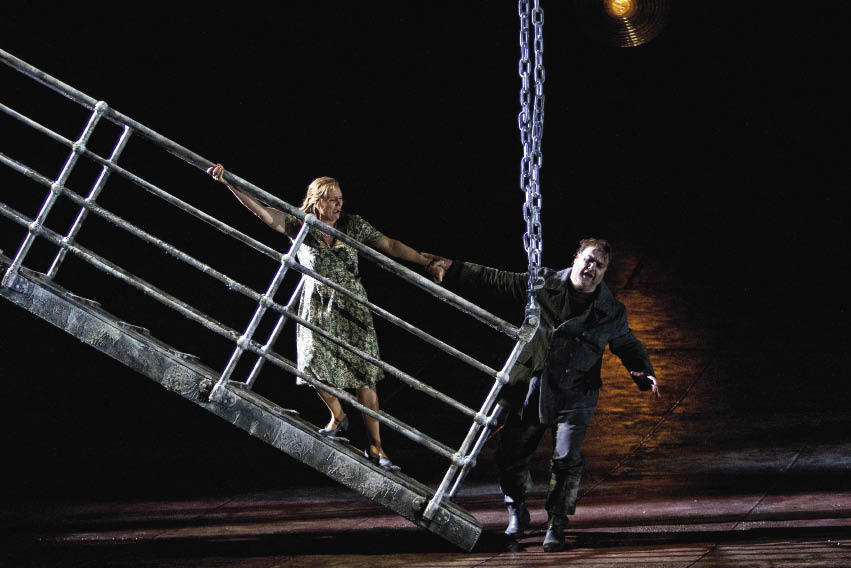Doctor Atomic
English National Opera
Der fliegende Holländer
Royal Opera House
John Adams’s latest opera Doctor Atomic, in a production shared with the New York Met, had its UK première at the English National Opera, and was greeted with the kind of cheers that you don’t often encounter in opera houses. It bored me in a way so special that I feel the need, sometime soon, to do a typology of operatic boredoms: there is the tedium of endless undistinguished recitative, the da capo of an aria which gave very mild pleasure the first time round, the unreal clemency of wronged monarchs worked out in a series of decreasingly dramatic situations, and then the flatulence of late-Romantic conflations of love and death and anything else pretty terminal, with in between the infuriating cheerfulness of cabalettas expressing unrequited passion in many an undeservedly resurrected bel canto piece. Doctor Atomic is unlike any of those in that it concerns a suspenseful situation on which the future of mankind, or the planet, depends, and the people who are involved in that, responsible for it, fascinated by it, above all scientists who are curious about it. It could hardly help being a heady brew. And yet it isn’t that at all, despite the superb cast, the glamorous and efficient production, and the sleekness of the whole enterprise.
Because it presents historical personages of the recent past in a frightening situation, this opera can’t not resonate in some way: hence the peculiarity of its kind of boringness. One watches and listens as the scientists, wives, local population of New Mexico wait, in appalling weather, for the first atom bomb to explode, and one feels no engagement with any of it. This is a formulaic Sellars–Adams affair, with reams of dull conversations which is recalcitrant to musical setting, so merely sung while the orchestra chugs mechanically on. There is a big scene of love and doubt and drink for Oppenheimer, the central character, and his wife, set to smoochy music which a Hollywood hack would have easily improved on. There is the interminable wait for the explosion — and one has to admit that interminability is one thing that Sellars and Adams are effortlessly proficient at: but there is no suspense whatever. Never getting inside any of the characters, we merely see them agonising and hope that the explosion will come soon so that the whole thing can end. When the non-musical rumble finally does arrive, and subside, we hear a Japanese woman asking, again and again, for water. It’s terrible, but is it art? And if asking that question is considered an impertinence under the circumstances, then that seems to me to invalidate the whole enterprise. Immense issues never, by themselves, make for significance in the theatre. Anyone who found this a moving experience should ask themselves what kind of response was being called forth.
The Royal Opera’s new production of Wagner’s first masterpiece, Der fliegende Holländer, directed by Tim Albery, is a drab affair. Time: more or less the present, the characters dressed in clothes from a charity shop. No portrait of the Dutchman for Senta to gaze at and scream when the real one walks on. She carries a toy galleon around, and at the end drops dead on the spot, while the Dutchman disappears into the wings. The sea is conspicuous by its absence, apart from during the overture, when waves pass over the curtain; and there seems to be a small paddling pool at the front of the stage. The basic set is a large bowl within which the characters move, and on to which a room full of sewing machines descends for the second scene — the production is laudably done in one act — and out of the bottom of which the Dutchman’s crew emerges in the last scene. There is no atmosphere.
Bryn Terfel sings well in the title role, though no better than in Wales three years ago. His range of dynamics is impressive, his voice secure, but the intolerable yearning of the character just isn’t there, yet. Anja Kampe as Senta is more identified with her redemptive role, and, though she didn’t bring any distinction to the Ballad on the opening night, later on she was thrilling. The main defect is in the conducting of Marc Albrecht. After a sensational start to the overture he let things fall apart time and again, and the orchestra responded with some uncharacteristically sloppy, ill-tuned playing, especially of Senta’s theme. The central feature of this great work is its urgency, but that could not be felt, almost ever, in this performance, and certainly not in the central duet, where it is crucial: the supra-personal power which pulls the two main characters together has yet to make an appearance. The subsidiary characters were adequate, without distinction. But can this tight-voiced if impassioned Erik, Torsten Kerl, really cope with Tristan at Glyndebourne in a few months? Hans-Peter König makes a reasonably rollicking Daland, but in the duet with the Dutchman neither made much of the contrasting character of their vocal lines, so vividly conveying their characters. Still, of Covent Garden’s last three Holländer, this is the least unsatisfactory.





Comments